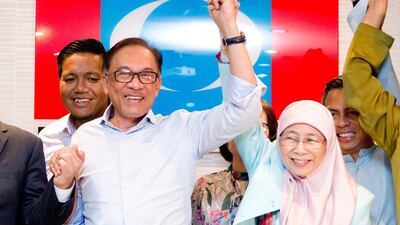We are about to witness not the second but the third incarnation of Anwar Ibrahim's political career. Malaysia's former deputy prime minister is now the prime minister-designate, following the May 9 victory of his Pakatan Harapan (PH) coalition, and will take over when the incumbent, Dr Mahathir Mohamad, steps down in about two years. Mr Anwar has additionally announced he will stand in a by-election next month and return to parliament.
The October 13 poll is sure to see him win easily and cap a transformative few months for a man whom supporters compare to Nelson Mandela. They insisted his convictions for sodomy and corruption in 1999 were unjust and were vindicated when Malaysia's king issued Mr Anwar with a full pardon just after this year's general election.
Having already taken his place as the official president of his own People’s Justice Party (PKR), which has the largest number of MPs in parliament, it will mark a return to public office for Mr Anwar, who lost the 2013 general election but won nearly 51 per cent of the popular vote, only to find himself back in jail in 2015 when his 2012 acquittal from another sodomy charge was overturned.
Last week marked the 20th anniversary of his initial undoing. A high-flying finance minister who was friends with the likes of then US vice president Al Gore, Mr Anwar was deputy prime minister to Dr Mahathir in 1998 and his presumed successor.
That path came to an abrupt halt, however, when he was arrested, stripped of his positions in government and the ruling party, United Malays National Organisation (UMNO), and was next seen in court with a vivid black eye inflicted by the police inspector general. After he was jailed, the falling-out appeared permanent and the reputational damage to the UMNO-led Barisan Nasional coalition government was devastating. According to Dr Mahathir, Mr Anwar had successfully demonised him in the eyes of the world.
That Mr Anwar is once again Dr Mahathir's heir is emblematic of the many contradictions of both men, of the state of Malaysian politics today and about the febrile public mood in the country.
For starters, there is the astonishing degree of hostility levelled at Mr Anwar – and not from supporters of the formerly ruling Barisan Nasional coalition, crushed by their first ever loss of power at a national level. The criticism is coming from his own side and is widespread on social media and news portals.
Mr Anwar, these new detractors say, is in too much of a hurry. He should stop commenting on the actions of the government and cease meeting high-level officials at home and abroad. The by-election is an affront to the voters who had only recently elected another MP for that constituency. Others object to his past record in government as finance and education minister. Mr Anwar’s supposed Islamist agenda and friendship with Turkish President Recep Tayyip Erdogan are also held against him.
Yet Mr Anwar was the glue that held the former opposition together and without his efforts over the years, it is unlikely that PH would have managed to get over the finishing line in May. And as the prime minister-designate, it is reasonable for him to want to return to parliament swiftly, not least as Dr Mahathir is 93 years old and should anything happen to him before Mr Anwar returns to parliament, it could cause a constitutional crisis.
But while he has always been charismatic, intelligent and humorous, Mr Anwar is also divisive. “He’s the reason we have to cover our heads,” one liberal female literary figure, who supported the change of government, told me. There have also been public rows about child marriage and the teaching of religion in schools.
They are symptomatic of the feeling that the various reconciliations and new alliances might not be all they seem and that all is to play for in the crucial Malay electorate. Will UMNO recover? Or will it collapse into the arms of Mr Anwar’s party or Dr Mahathir’s Malaysian United Indigenous Party (PPBM), specifically formed to reassure Malay voters that they could safely abandon UMNO?
Both Dr Mahathir and Mr Anwar have sought to pour oil on troubled waters and have consistently made mutually supportive statements. But there is a strong sense of turmoil beneath the surface and that the proliferation of new parties and fracturing of the electorate over the last few years might not yet be over.
Given that both their parties are led by ex-UMNO members, that also leads to the question of exactly how new the “new Malaysia” being talked about will eventually turn out to be. While issues of good governance are being strongly stressed, it is clearly not going to be as liberal as some had hoped.
So Mr Anwar returns at a very unsettled time. The challenge will be for him to be patient and unifying. His supporters must hope that the crown that has eluded him for so long will eventually be his, while all Malaysians must hope that he turns out to be the man they claim he is.
Sholto Byrnes is a senior fellow at the Institute of Strategic and International Studies Malaysia


